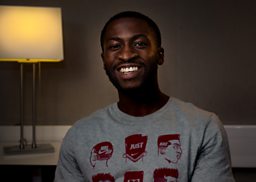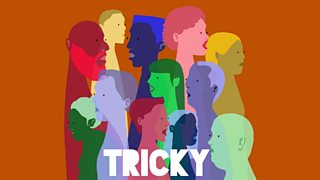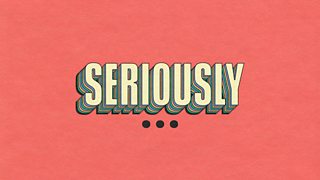Black Lives Matter: A Movement or a Moment?
Βι¶ΉΤΌΕΔ Radio 4’s Tricky podcast gathers four experts to talk about the big issues facing society, creating a conversational space where all are welcome to share their opinions and experiences without fear of judgement.
In Black Lives Matter: A Moment or a Movement?, poet Vanessa Kisuule, visual artist Sekai Machache, David Chukwujekwu from Intercultural Youth Scotland and Aberdeen-based musician Ransom FA discussed Black Lives Matter’s power as a rallying cry. Here is Ransom FA’s take on the experience...

It’s been a politically and socially tumultuous few months. It’s often a scary place for many people when there is so much turmoil surrounding us.
Despite our opinions on the phrase, 'Black Lives Matter', we can agree it has created a space for healthy conversation and debate.
In the wake of a pandemic, another epidemic came to a head. Arguably a pandemic that predated Coronavirus, but one we left undealt with. Black Lives Matter is a statement we have heard uttered so much recently. It’s crazy that the statement that a person of colour's life matters is as political as it is. Outside of the organisation that originally coined the phrase, I think why it resonated with so many people of colour was the amount of white people that hesitated to agree with the simple statement of "black lives matter". However I think that despite our opinions on the phrase, we can agree it has created a space for healthy conversation and debate.
These conversations have included a debate about how people of colour have been portrayed in the media. The understanding that having a healthy balance of portrayals of under-represented groups creates an honest picture of the world and its residents.
It’s also created a conversation around being open about the mistakes within our justice system, not just on things happening now, but on things that have already happened and caused generational trauma. For instance, the Sheku Bayoh case, where a father of two died after being restrained by police. George Floyd’s case was a stark parallel to Sheku’s case, though it happened thousands of miles away. Both men had kids, both died at the hands of police, both couldn’t breathe. And unfortunately, so often black people feel that, when crimes are committed against them and their communities, there is no justice. There has been no justice for Sheku Bayoh, Breonna Taylor, and George Floyd.
That’s why this conversation, as uncomfortable as it might feel to some, is so important.
If you look into the history of Scotland, there were previously divisions because of religion. There is division in all elements of our history. This is something that ripples down to the present. But Aberdeen Football Club chose to use "Stand Free" as their anthem when other football teams picked a side, meaning that regardless of Protestant or Catholic beliefs, all can stand free.

We (Scotland) as a nation have accepted our parts in religious persecution. And it’s easy to think because we are no longer slaughtering each other on the streets that injustice isn’t happening on our doorstep. However, when the Black Lives Matter movement erupted there were racial slurs graffitied around Aberdeen – somewhere I had always believed was a place of acceptance. But it’s the realisation that nobody and nowhere is exempt from propagating anti-black narratives, that we all need to endeavour to do better.
My music has always been about positivity and honesty. Music is a powerful medium that can bring people together, educate, and resonate. It's why I identified with the Aberdeen football club’s slogan “Stand Free” and use it as a huge part of my brand is because of what it represented. Allowing people to stand free in their authenticity, and uniqueness.
Right now it’s not about pointing fingers and blame, it’s about how we move forward. Re-investing in our local communities, making the difference on your front door. Re-opening youth clubs, re-investing in education, diversifying education, looking at how we can improve the criminal justice system so it works for everyone and not against ANYONE. Creating a safe space to be able to discuss race openly without fear of becoming overly politicised.
Black people have always done great things, and will continue to do great things. We just need to re-adjust how we think about each other, any “marginalised'' group, the unconscious and conscious biases we hold. Every individual regardless of skin colour, nationality or creed has a responsibility for the effect they have in their interactions with others.
Ultimately we are all human and prone to make mistakes, but it’s about owning the mistakes, being accountable and making a concise effort to properly educate and understand where we messed up. We have to give homage to those who lay the trail before us and work as hard as we can to continue to move forward and not backwards.
-
![]()
Listen to Tricky: Black Lives Matter - A Moment or a Movement?
Ransom FA, Sekai Machache, Vanessa Kisuule and David Chukwujekwu discuss.
More to Discover
-
![]()
The Secret Life of Teachers
Step inside Mehreen Baig’s virtual staffroom to hear what the UK’s teachers really think.
-
![]()
Grounded with Louis Theroux
Stuck at home, Louis is using the lockdown to track down some high-profile people he's been longing to talk to.
-
![]()
Tricky
Listen to more episodes of Tricky
-
![]()
Seriously...
A rich selection of documentaries aimed at relentlessly curious minds.




